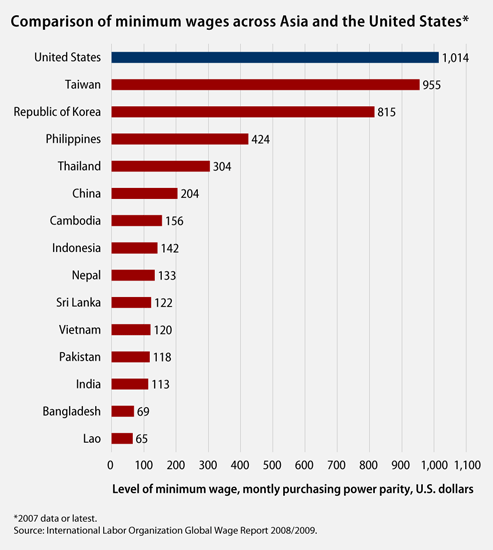Bangladesh is more than a day away by plane, on a different continent, on the other side of the globe. Why should Americans care that Bangladeshi workers are taking to the streets in violent protest over their low wages? Why should we care about the persecution of labor leaders in Bangladesh? Beyond fundamental human rights considerations, we should care because ensuring "just jobs"—jobs commensurate with decent wages, labor rights, and good working conditions in developing countries such as Bangladesh—is in the hard-nosed economic self-interest of the United States.
This is why the House International Worker Rights Caucus, led by Reps. Phil Hare (D-IL) and Jan Schakowsky (D-IL) wrote a letter to six major companies calling on them to take a stand against the recent persecution of labor leaders in Bangladesh. The six companies—JC Penny, Wal-Mart, SEARS/Kmart, VF Corporation, Cintas Corporation, and H&M—are major purchasers of apparel from factory owners in Bangladesh. These companies must take a stand against the arrest of these labor leaders, but Congress also should continue to forge ahead forcefully in seeking to improve the lives of workers in Bangladesh and elsewhere in the developing world.
Bangladesh has some of the lowest paid garment workers in Asia (see Figure 1). Bangladeshi Prime Minister Sheikh Hasina called the country’s minimum wage "not only insufficient but also inhuman" before she raised it to $43 per month, which was lower than the $75 that workers were demanding. When the government’s increase failed to meet worker’s expectations for a raise that would offset the fluctuations in commodity prices, enraged workers took to the streets. The authorities responded by arresting several labor leaders, including two from the Bangladesh Center for Worker Solidarity, a well-respected and leading labor rights nongovernmental organization in Dhaka, on dubious charges of instigating violence.

U.S. companies purchasing apparel in Bangladesh have an opportunity to help rectify this situation. U.S. industries, and those in other developed countries, are intrinsically linked to networks of workers and suppliers in the developing world. U.S. companies are major purchasers of garments made in the developing world and can be highly effective in ensuring that suppliers treat their workers fairly. After all, the share of wages in the cost of production is fairly low so that companies can afford to pay more to ensure that suppliers pay workers a decent wage without a significant reduction in their bottom line profits.
Then there are the many disadvantages that labor unrest causes U.S. companies operating in Bangladesh and other developing countries like it. Political instability can make it difficult for companies to operate. There is also the negative publicity for companies associated with labor exploitation and poor working conditions. Companies can make it clear to their suppliers that the persecution of labor rights advocates will adversely affect their dealings. And they can contact the Bangladeshi government to express their concern over the plight of the labor leaders. This is what the letter from the House International Worker Rights Caucus calls on them to do.
But Congress shouldn’t stop at sending a letter on this occasion alone. There are significant long-term economic advantages for the United States to ensure that workers in the developing world have access to just jobs. Rising living standards in the developing world means new potential markets for our own products and services because consumers there can afford to buy more of our exports. Better labor standards also help level the playing field in markets worldwide.
What’s more, when workers are adequately compensated and protected, they are less likely to protest trade and economic integration that can serve as important engines of global economic growth. And finally, rising living standards and just jobs in the developing world help promote political stability and decrease the susceptibility to violence, terrorism, and crime.
This is why Congress should ensure that labor and just jobs are given due attention in all legislation related to foreign assistance reform. In addition, strong labor provisions should be part of all our trade agreements, and Congress should be vigilant in ensuring that trading partners are taking tangible steps to enforce labor provisions in trade agreements. Congress should make sure that our agencies and international institutions are sufficiently funded to build strong labor institutions in developing countries.
Just jobs are not pie-in-the-sky dreams. In a world where rising living standards in other countries coincide with rising living standards in our own, there develops a virtuous circle of economic prosperity—a rising tide lifts all boats. But in a world where economic elites in a country such as Bangladesh exploit workers for their own profit, this restrains standards of living from rising and leads to more social unrest and political instability, which in turn adversely hurts American companies and our economy at large. Which do you think is the preferred alternative?
Sabina Dewan is Associate Director of International Economic Policy at the Center for American Progress.